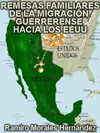Ramiro Morales Hernández
Esta página muestra parte del texto pero sin formato.
Puede bajarse la tesis completa en PDF comprimido ZIP (267 páginas, 1,02 Mb) pulsando aquí
RESUMEN
Esta investigación aporta elementos para aclarar la importancia de las remesas monetarias enviadas por emigrantes guerrerenses en los Estados Unidos a sus familiares en el estado de Guerrero, México, por lo que toca a la disminución de los niveles de marginación o el mejoramiento del Índice de Desarrollo Humano. Un extenso análisis cuantitativo permitió hacer las comparaciones pertinentes, primero a nivel de las regiones del país, y luego a nivel de las regiones del estado de Guerrero, y por último, una serie de entrevistas a familiares de emigrantes nos facilitó determinar los usos de las remesas.
Los resultados de la investigación indican que las remesas familiares logran tener efectos importantes en la disminución de los Índices de Marginación, o en la elevación de los Índices de Desarrollo Humano en el caso de algunas regiones del estado de Guerrero, pero no en todas. Las regiones con una emigración muy reducida, por obvias razones, no experimentan ninguna mejora en los índices de Marginación o de Desarrollo Humano. Si dejamos a un lado el análisis regional y nos avocamos al estudio de los receptores de las remesas, los efectos directos de éstas, desde luego, son notables en términos del mejoramiento de su calidad de vida. Se descubre, además, que las remesas son utilizadas, desde luego, para atender necesidades básicas de alimentación, salud, vivienda y vestido; pero también como inversión en la creación o compra de empresas familiares, con lo cual las remesas coadyuvan al desarrollo regional, proporcionando autoempleo y reactivando las economías locales.
FAMILY REMITTANCES AND LIFE CONDITIONS IN THE CONTEXT OF MIGRATION FROM GUERRERO TO THE UNITED STATES OF AMERICAN.
ABSTRACT
This dissertation presents key elements that facilitate our understanding of the importance of monetary remittances sent by migrant workers from the state of Guerrero, México, in the United Sates, to their families, as far as the Index of Marginality or the Index of Human Development are concerned. An extensive quantitative analysis was used to make the pertinent comparisons, first at the level of the whole country of Mexico; and then between regions in the state of Guerrero; and, finally, a series of interviews of the relatives of the migrants indicate how the remittances are used.
The results indicate that family remittances have important effects in the lowering of the Index of Marginality or in the increase of the Index of Human Development, in the case of some of the regions, but not in all of them. Regions with minimum migration, obviously, do not experiment any decrease in the Index of marginality or any increase in the Index of Human Development. If we set aside regional analysis, and concentrate on the direct effects on those who receive the remittances, the effects are, of course, outstanding in terms of the improvement of their quality of life. We discover, in addition, that remittances are used, of course, to attend basic needs of food, health, shelter, and clothing; but they are also used for investment in the creation of purchase of family enterprises. This means that remittances serve as important means for regional development, for self-employment, reactivating local economies.


